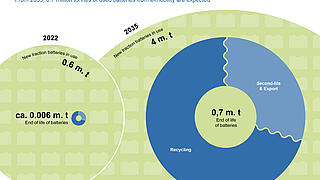Electromobility is the key technology for reducing the transport sector’s dependence on fossil fuels and cutting its climate-damaging greenhouse gas emissions. The main factors influencing the climate benefits of e-mobility are the use of renewable energies to power vehicles, and its improved energy efficiency compared with the internal combustion engine. Overall, however, the environmental benefits of e-mobility will depend to a large extent on how it is conceptualised – because climate-friendly mobility is not just a question of technological development. It must be accompanied by awareness of sustainable mobility behaviour, and the policy framework must be designed to reward such behaviour.
The Oeko-Institut’s researchers assess the potential of e-mobility from a broad perspective. They analyse the opportunities and challenges associated with the market ramp-up of the new drive technologies, and audit these technologies’ climate and resource footprints. They calculate the effects on electricity demand in Germany and identify cost savings and emissions reductions compared with combustion engine vehicles. Issues relating to the charging infrastructure and comprehensive sustainability assessments for resource inputs along the supply chain are a further focus of their research.
![[Translate to English:] © plainpicture / Andreas Körner](/fileadmin/_processed_/7/1/csm_Mobilit%C3%A4tswende-Elektromobilit%C3%A4t_plainpicture-Andreas-K%C3%B6rner_2683d7c314.jpg)












